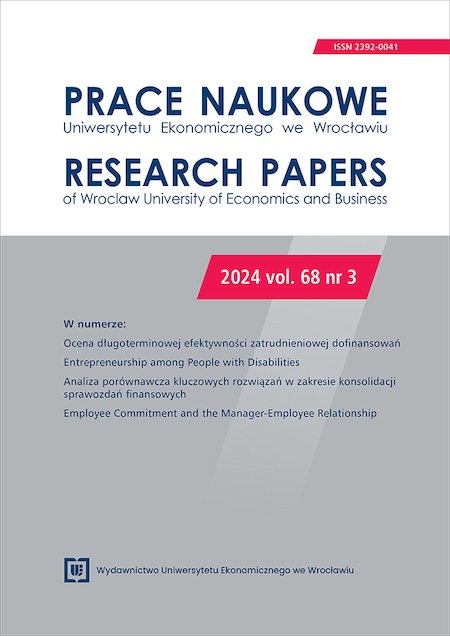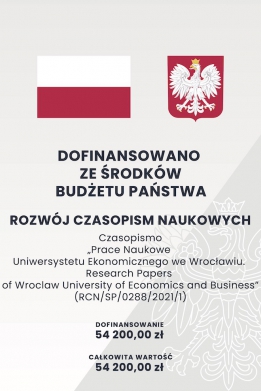Employee Commitment and the Manager-Employee Relationship. An International Work Environment Leadership Model
Keywords:
employee commitment, manager-employee relationship, international work environment (IWE), leadership, leader-member exchange (LMX)Abstract
Aim: The primary objective of this article is to thoroughly explore the issue of employee commitment within the context of the manager-employee relationship and proposing a model of the process of preparing manager to build superior-subordinate relation and form employee commitment in the organisation’s foreign branch.
Methodology: The qualitative method of research was implemented in the form of individual in-depth interviews (IDIs) conducted with top managers of internationally operating organisations.
Results: Manager-employee relationships evolve. To make the process more satisfactory for both sides, the Leader-Member Exchange (LMX) theory and Positive Organizational Scholarship (POS) concept should be integrated in it. Both concepts are inherently linked to employee management in the international environment. Furthermore, LMX is evolving towards relational leader-member exchange (RLMX). The process of adaptation to a new work environment is connected not only with the cultural, but also personal characteristics of managers and their experience in operating in international organizations. Cultural differences can significantly affect supervisor-superior relation and employee commitment. Nevertheless, it also seems that universal virtues such as respect and trust, shape the dynamism of the process, which consists of stages described in the conceptual model.
Implications and recommendations: To reduce or actually minimise the impact of cultural factors on relations between managers and employees, it is necessary to find the appropriate style of leadership and adjust it to each individual. What makes the process successful is the recognition of local employees’ needs as well as the implementation of positive motivation methods.
Originality/value: The article aims to contribute to the discourse on LMX and POS in the context of leadership style in international work environment (IWE). Both approaches should be studied in parallel to identify the key determinants of a manager’s success, reaching beyond the cross-cultural dimension. Contrary to the models presented in the literature, the proposed model is based on managers’ perception of the process of adaptation to the host country’s culture.
Downloads
References
Aselage, J., and Eisenberger, R. (2003). Perceived Organizational Support and Psychological Contracts: A Theoretical Integration. Journal of Organizational Behavior, 24(5), 491-509. https://doi.org/10.1002/job.211
Ashkanasy, N. M., and Härtel, C. E. (2014). Positive and Negative Affective Climate and Culture: The Good, the Bad, and the Ugly. In B. Schneider, K. Barbera (Eds.), New York: The Oxford Handbook of Organizational Culture and Climate (pp. 136-152).
Austen, A., Marzec, I., and Polok, G. (2018). W kierunku zaufania organizacyjnego. Komunikowanie i jakość relacji między przełożonym a podwładnym w sądach powszechnych. Organization and Management, 181(2), 175-187.
Avril, A. B., and Magnini, V. P. (2007). A Holistic Approach to Expatriate Success. International Journal of Contemporary Hospitality Management, 19(1), 53-64. https://doi.org/10.1108/09596110710724161
Bartosik-Purgat, M. (2006). Otoczenie kulturowe w biznesie międzynarodowym (The Cultural Environment in International Business). Polskie Wydawnictwo Ekonomiczne.
Bauer, T. N., and Erdogan, B. (2015). Leader – Member Exchange (LMX) Theory: An Introduction and Overview. In N. T. Bauer, B. Erdogan (Eds.), The Oxford Handbook of Leader-Member Exchange (pp. 3-9). Oxford University Press. https://doi.org/10.1093/oxfordhb/9780199326174.013.0002
Bono, J. E., and Ilies, R. (2006). Charisma, Positive Emotion and Mood Contagion. Leadership Quarterly, (17), 317-334.
Budzanowska-Drzewiecka, M., Marcinkowski, A. S., and Motyl-Adamczyk, A. (2016). Różnice kulturowe w komunikacji biznesowej. Wydawnictwo Uniwersytetu Jagiellońskiego.
Cahill, K. E., McNamara, T. K., Pitt-Catsouphes, M., and Valcour, M. (2015). Linking Shifts in the National Economy with Changes in Job Satisfaction, Employee Engagement and Work-life Balance. Journal of Behavioral and Experimental Economics, (56), 40-54. https://doi.org/10.1016/j.socec.2015.03.002 Cameron, K. S., Dutton, J. E., and Quinn, R. E. (2003). An Introduction to Positive Organizational Scholarship. In K. S. Cameron, J. E. Dutton, R. E. Quinn (Eds.), Positive Organizational Scholarship (pp. 3-13). Berrett-Koehler.
Cameron, K. S. (2008). Paradox in Positive Organizational Change. The Journal of Applied Behavioral Science, 44(1), 7-24, https://doi.org/10.1177/0021886308314703
Day, D. V., and Miscenko, D. (2016). Leader-member Exchange (LMX): Construct Evolution, Contributions, and Future Prospects for Advancing Leadership Theory. The Oxford Handbook of Leader-Member Exchange, 9-28.
Dewing, J., and McCormack, B. (2015). Engagement: A Critique of the Concept and Its Application to Person-centred Care. International Practice Development Journal, 5, 1-10. https://doi.org/10.19043/ipdj.5SP.008
Diefenbach, T., and Sillince, J. A. A. (2012). Crossing of Boundaries – Subordinates’ Challenges to Organisational Hierarchy. In T. Diefenbach, R. Todnem By (Eds.), Reinventing Hierarchy and Bureaucracy – from the Bureau to Network Organizations Research in the Sociology of Organizations. https://doi.org/10.1108/S0733-558X(2012)0000035009
Farndale, E., Beijer, S. E., Van Veldhoven, M. J. P. M., Kelliher, C., and Hope-Hailey, V. (2014). Work and Organisation Engagement: Aligning Research and Practice. Journal of Organizational Effectiveness: People and Performance, 1(2), 157-176. https://doi.org/10.1108/JOEPP-03-2014-0015
Gesteland, R. R. (2000). Różnice kulturowe a zachowania w biznesie (Cultural Differences and Behaviour in Business). Polskie Wydawnictwo Ekonomiczne.
Glińska-Neweś, A. (2017). Pozytywne relacje interpersonalne w zarządzaniu. Wydawnictwo Naukowe Uniwersytetu Mikołaja Kopernika.
Glińska-Neweś, A., and Escher, I. (2018). Analiza treści w badaniach zjawisk społecznych w organizacji. Zastosowanie programu IRAMUTEQ. Studia Oeconomica Posnaniensia, 3(6), 73-94. https://doi.org/10.18559/SOEP.2018.3.4
Gohi, L., Wang, W., Gohi, B., Bohou, B., and Traore, D. (2022). A Review of Cross-Cultural Training Research: The Past 10 Years and Implications for Moving Forward. Journal of Human Resource and Sustainability Studies, (10), 653-671. https://doi.org/10.4236/jhrss.2022.104038
Grzesiuk, A. (2018). Zagraniczne dezinwestycje bezpośrednie – doświadczenia polskich przedsiębiorstw handlowych. Handel Wewnętrzny, 6(377), 149-159. https://www.researchgate.net/publication/331936588
Hannah, S. T., Sumanth, J. J., Lester, P., and Cavarretta, F. (2014). Debunking the False Dichotomy of Leadership Idealism and Pragmatism: Critical Evaluation and Support of Newer Genre Leadership Theories. Journal of Organizational Behavior, 35(5), 598-621. https://doi.org/10.1002/job.1931
Hirvi, S. K., Laulainen, S., and Taskinen, H. (2021). Trust as a Multidimensional Phenomenon in LMX Relationships. Journal of Health Organization and Management, 35(1), 17-33.
Hofstede, G. (2000), Kultury i organizacje. Zaprogramowanie umysłu (Cultures and Organizations. Software of the Mind). Polskie Wydawnictwo Ekonomiczne.
Hurn, B. J. (2007). Pre-departure Training for International Business Managers. Industrial and Commercial Training, 39(1), 9-17. https://doi.org/10.1108/00197850710721354
Iskhakova, M., and Ott, D. L. (2020). Working in Culturally Diverse Teams: Team-level Cultural Intelligence (CQ) Development and Team Performance. Journal of International Education in Business, 13(1), 37-54.
Jain, N. K., Srivastava, P., and Owens, D. (2014). Leader-member Exchange and Resource Accessibility of Subordinates: Perception towards MNC Global Integration Strategy. Leadership & Organization Development Journal, 35(6), 494-512.
Jalilvand, R. M., and Vosta, N. L. (2015). Examining the Relationship between Managerial Power and Affective Organizational Commitment. An Empirical Study in the Sport Sector of Iran. Sport, Business and Management: An International Journal, 5(4), 344-364. https://doi.org/10.1108/SBM-04-2011-0041
Kankaanranta, A., and Lu, W. (2013). The Evolution of English as the Business Lingua Franca: Signs of Convergence in Chinese and Finnish Professional Communication. Journal of Business and Technical Communication, 27(3), 288-307. https://doi.org/10.1177/1050651913479919
Karaszewski, R., and Lis, A. (2016). Czy koncepcja pozytywnego przywództwa może stać się paradygmatem w naukach o zarządzaniu? Nauki o Zarządzaniu, 2(27), 72-80. https://doi.org/10.15611/noz.2016.2.06
Kastanakis, M., and Voyer, B. G. (2014). The Effect of Culture on Perception and cognition: A Conceptual Framework. Journal of Business Research, 67(4), 425-433. ISSN 01482963
Klimas, P. (2013). Relacje interpersonalne kadry kierowniczej jako czynnik sprawności sieci. Organizacja i Kierowanie, 3(156), 149-160.
Kmiotek, K. (2016). Uwarunkowania zaangażowania organizacyjnego pracowników (przykład inżynierów). Nauki o Zarządzaniu, 2(27), 81-90. https://doi.org/10.15611/noz.2016.2.07
Krishnan, V. R. (2004). Impact of Transformational Leadership on Followers’ Influence Strategies. Leadership & Organization Development Journal, 25(1), 58-72.
Liu, C. H., and Lee, H. W. (2008). A Proposed Model of Expatriates in Multinational Corporations. Cross Cultural Management, 15(2), 176-193. https://doi.org/10.1108/13527600810870615
Margolis, J. D., and Walsh, J. P. (2003). Misery Loves Companies: Rethinking Social Initiatives by Business. Administrative science quarterly, 48(2), 268-305.
Martin, R., Guillaume, Y., Thomas, G., Lee, A., and Epitropaki, O. (2016). Leader–member Exchange (LMX) and Performance: A Meta – Analytic Review. Personnel Psychology, 69(1), 67-121.
Men, L. R. (2015). Employee Engagement in Relation to Employee – Organization Relationships and Internal Reputation: Effects of Leadership Communication. Public Relations Journal, 9(2). https://www.researchgate.net/publication/280804909
Munoz-Doyague, M. F., and Nieto, M. (2012). Individual Creativity Performance and the Quality of Interpersonal Relationships. Industrial Management & Data Systems, 1(112). https://doi.org/10.1108/02635571211193671
Nahrgang, J. D., and Seo, J. J. (2015). How and Why High Leader-member Exchange (LMX) Relationships Develop: Examining the Antecedents of LMX. The Oxford Handbook of Leader-Member Exchange, 87-118.
Parry, E., Farndale, E., Brewster, C., and Morley, M. J. (2021). Balancing Rigour and Relevance: The Case for Methodological Pragmatism in Conducting Large-Scale, Multi-country and Comparative Management Studies. British Journal of Management, (32), 273–282. https://doi.org/10.1111/1467-8551.12405
Peltokorpi, V., and Froese, F. (2014). Expatriate Personality and Cultural Fit: The Moderating Role of Host Country Context on Job Satisfaction. International Business Review, 23, 293-302.
Rockstuhl, T., Dulebohn, J. H., Ang, S., and Shore, L. M. (2012). Leader–member Exchange (LMX) and Culture: A Meta-analysis of Correlates of LMX across 23 Countries. Journal of Applied Psychology, 97(6), 1097-1130. https://doi.org/10.1037/a0029978
Rockstuhl, T., Eisenberger, R., Shore, L. M., Kurtessis, J. N., Ford, M. T., Buffardi, L. C., and Salar, M. (2020). Perceived Organizational Support (POS) across 54 Nations: A Cross-cultural Meta-analysis of POS Effects. Journal of International Business Studies, 51(6), 933-962. https://doi.org/10.1057/s41267-020-00311-3
Sam, T. H., Isa, K., Palpanadan, S. T., and Ping, W. X. (2024). Perspectives of Perceived Organizational Support (POS) Theory Towards Individual Happiness. Revista de Gestão Social e Ambiental, 18(9), e05753-e05753.
Stahl, G. K., and Tung, R. (2015). Towards a More Balanced Treatment of Culture in International Business Studies: The Need for Positive Cross-cultural Scholarship. Journal of International Business Studies, (46), 391-414.
Stefańska, M., and Grabowski, G. (2023). Empowerment and the Quality of Superior-subordinate Relationships in the International Business Environment. e-mentor, 4(101), 11-17. https://doi.org/10.15219/em101.1624
Stefańska, M., and Olejnik, I. (2021). Dobór próby i analiza wyników w badaniach jakościowych. In M. Rószkiewicz, K. Mazurek-Łopacińska, A. Sagan (Eds.), Dobór próby we współczesnych badaniach marketingowych. Podejścia ilościowe, jakościowe i mieszane (pp. 59-74). Uniwersytet Szczeciński.
Stoermer, S., Davies, S., and Froese, F. (2021). The Influence of Expatriate Cultural Intelligence on Organizational Embeddedness and Knowledge Sharing: The Moderating Effects of Host Country Context. Journal of International Business Studies, (52), 432-453. https://doi.org/10.1057/s41267-020-00349-3
Sulea, C., Virga, D., Maricutoiu, L. P., Schaufeli, W., Zaborila Dumitru, C., and Sava, F. A. (2012). Work Engagement as Mediator between Job Characteristics and Positive and Negative Extra-Role Behaviors. Career Development International, 3(17), 188-207. https://doi.org/10.1108/13620431211241054
Terpstra-Tong, J., Ralston, D. A., Treviño, L. J., Naoumova, I., De la Garza Carranza, M. T., Furrer, O., Li, Y., and Darder, F. L. (2020). The Quality of Leader-Member Exchange (LMX): A Multilevel Analysis of Individual-level, Organizational-level and Societallevel Antecedents. Journal of International Management, 26(3), 100760. https://doi.org/10.1016/j.intman.2020.100760
Thompson, G., Buch, R., and Glasø, L. (2018). Low-quality LMX Relationships, Leader Incivility, and Follower Responses. Journal of General Management, 44(1), 17-26.
Tung, R. L., and Stahl, G. K. (2018). The Tortuous Evolution of the Role of Culture in IB Research: What We Know, What We Don’t Know, and Where We Are Headed. Journal of International Business Studies, (49), 1167-1189. https://doi.org/10.1057/s41267-018-0184-2
Tutar, H., Altinoz, M., and Cakiroglu, D. (2014). A Study on Cultural Difference Management Strategies at Multinational Organizations. Procedia – Social and Behavioral Sciences, (150), 345-353. https://doi.org/10.1016/j.sbspro.2014.09.023
Varma, A., Stroh, L. K., and Schmitt, L. B. (2001). Women and International Assignments: The Impact of Supervisor-Subordinate Relationship. Journal of World Business, 36(4), 380-388. https://doi.org/10.1016/S1090-9516(01)00062-1
Vlad, M., and Stan, S. O. (2018). The Influence of Cultural Differences and Its Application in Multinational Organizations. Management Dynamics in the Knowledge Economy, 6(3), 405-422. https://doi.org/10.25019/MDKE/6.3.04
Waxin, M-F., and Brewster, C. (2020). The Recruitment, Selection and Preparation of Expatriates. Chapter 2. In J. Bonache, C. Brewster, F. J. Froese (Eds.), Global Mobility and the Management of Expatriates. Cambridge University Press.
Wilson, K. S., Sin, H. P., and Conlon, D. E. (2010). What about the Leader in Leader-Member Exchange? The Impact of Resource Exchanges and Substitutability on the Leader. Academy of Management Review, 3(35), 358-372. https://www.researchgate.net/publication/276181903
Yahiaoui, D., Nakhle, S. F., and Farndale, E. (2021). Culture And Performance Appraisal In Multinational Enterprises: Implementing French Headquarters' Practices in Middle East and North Africa Subsidiaries. Human Resource Management, 2(60), 1-15. https://doi.org/10.1002/hrm.22063
Downloads
Published
Issue
Section
Categories
License
Copyright (c) 2024 Gabriel Grabowski, Magdalena Stefańska

This work is licensed under a Creative Commons Attribution-ShareAlike 4.0 International License.
Accepted 2024-08-01
Published 2024-09-24









